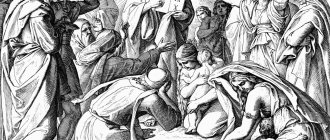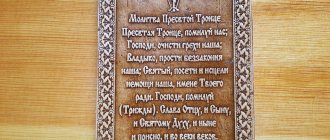Christian Library of God's Messages
There are 77 books in the Orthodox Bible, each of them tells about a certain period in the history of mankind and the formation of faith in the Creator. How to read the Bible correctly in order not only to be filled with historical information, but also to understand the meaning of God's revelations?
Orthodox Bible
You can get closer to the concept of God and learn His plan only from the Holy Scriptures.
Unlike Protestants, the Orthodox Church continues to study the Word of God, transmitted both in the Old and New Testaments, and through Traditions recorded from the oral memories of participants in those events. Since the 16th century, Protestants have abandoned the Sacred Traditions as not divinely inspired, for they were not written in Hebrew.
How many books are in the Orthodox Bible
The Orthodox Holy Scripture consists of 77 books, unlike the Protestant Bible, which has only 66 messages.
66 books are considered canonical, their texts were found in Jewish primary sources, 11 Old Testament books were translated from Greek, and their texts were questioned as inspired by God. The Old Testament in Orthodoxy consists of 50 books, 39 of which are recognized as having been written under the direction of God, for their texts are found in the Jewish Tanakh.
11 books written in Greek are considered non-canonical: Tobit, Judith, Wisdom of Solomon, Wisdom of Jesus, son of Sirach, Epistle of Jeremiah, Baruch, second and third books of Ezra, three Maccabees books. Without these books it is impossible to imagine the historical and spiritual value of the Creator's revelations.
Ancient scroll
The 27 books of the New Testament that describe Jesus' earthly life are not controversial. They contain 4 Gospels, the Acts of the Apostles, 19 Epistles of the Apostles and the Apocalypse.
How to Read the Bible and See Its Value
Orthodox canons recommend reading the Holy Scriptures in parallel with the Holy Traditions written by the Fathers of the Church in order to better understand the revelations.
For believers who are beginning to learn the Bible for the first time, it is advisable to receive the blessing of a spiritual mentor and listen carefully to his advice. Before you start reading the Holy Scriptures or Sacred Traditions, you should pray, ask the Almighty to bless and give wisdom to understand everything written.
Prayer to Jesus Christ
Lord Jesus Christ, open the eyes of my heart, so that when I hear Your Word, I understand it and fulfill Your will. Hide not Your commandments from me, but open my eyes, that I may understand the wonders of Your law. Tell me the unknown and secret of Your wisdom! I trust in You, my God, and I believe that You will enlighten my mind and meaning with the light of Your mind, and that then I will not only read what is written, but also fulfill it. Make it so that I do not read the Lives of the Saints and Your Word as a sin, but for renewal and enlightenment, and for holiness, and for the salvation of the soul, and for the inheritance of eternal life. For You, Lord, are the illumination of those who lie in darkness, and from You is every good gift and every perfect gift. Amen.
Sequence of reading the New Testament
- It is best to study the Holy Scripture, or rather the New Testament, the Gospel with the Good News transmitted by the Apostle Luke, who was a doctor by profession and lived in the time of the Apostle Paul. The Gospel of Luke gives the most detailed earthly biography of Jesus Christ, from genealogy to ascension.
- Some priests advise reading Mark first. This message is the shortest and easiest to read.
- Take your time to explore the other three gospels. Continue to enjoy Luke's revelations as conveyed in the Acts of the Apostles, which describe the lives of Jesus' disciples after His ascension to the Father.
- The Apostle John left his Gospel as a legacy to his descendants. Being the beloved and youngest disciple of Christ, John was able to convey to Christians the meaning of Jesus’ main mission - to save the world for the sake of God’s glory.
- Information about the earthly ministry of Christ is supplemented by the Gospels of Mark and Matthew.
- The letters to the churches written by the four apostles, Peter, Paul, James, and Jude, are surprising and delightful in their relevance to the problems of modern churches.
- The revelations recorded in Ephesians will help you feel truly protected by God and know your rights as an heir of the Living God.
- The Epistle to the Philippians will help restore the joy of communion with the Lord and give a new awareness of churching.
- The most difficult to read is the Apocalypse, written by the Apostle John during his exile on the island of Patmos. This revelation is encrypted and open to a select few.
Advice! Don’t rush to read the entire New Testament; at the same time, don’t get hung up on selected phrases pulled from the text. To understand the meaning of the message, try to find comments specifically on this text in order to understand the time and place of writing. There are entire volumes of commentaries on each book.
Reading the Bible
How to Read the Old Testament
After studying the New Testament, you can move on to the Old Testament, which contains laws that, according to Jesus himself, are a teacher for Christians.
- You shouldn't read everything. For example, having begun to get acquainted with the Old Testament, having read Genesis, Exodus, do not rush to learn Numbers and Levites, this requires a special understanding. It is better to study such books with the help of a spiritual guide.
- Notice Deuteronomy 28 gives the principles of blessing and cursing.
- The Book of Judges and Kings will reveal the historical aspect of the life of the Jews and the actions of God there.
- After reading historical books about the lives of kings, you can begin to get acquainted with the psalms. The reading of Psalms, such as 50, 90, 22 and others, is included in the prayer order of Orthodox Christians, but not everyone knows that these texts are taken from the Psalter, part of the Old Testament, which consists of 150 songs.
About the Psalms:
- Psalm of David 99
- Psalm of David 70
- Psalm of David 58
Experienced Christians have a whole list of psalms, divided into groups, which are read in various life situations:
- illness;
- on the road;
- despondency;
- depression;
- loneliness;
- anxiety and others.
Discover Proverbs. You know that there is a saying among Christians that reading one parable a day drives away the devil. The Bible contains 31 parables, one for each day of the month. Reading for the first time these messages, received by King Solomon and written down under the guidance of the Holy Spirit, you are amazed at their wisdom.
Wisdom, which is what Solomon asked God for when He asked about the king’s desires, made King Solomon the richest and wisest ruler in all the days of people’s lives on earth.
Wise Solomon
When reading Proverbs, you sometimes forget that they were written several thousand years ago, they are so relevant today.
Getting acquainted with the Holy Scripture for the first time, many former communists will see in it the principles of the Communist Party Manifesto, so there is nothing new under the sun. The great Russian writer Kuprin wrote Shulamith based on the Song of Songs and the life of King Solomon, using entire paragraphs from the Bible.
After reading an incomprehensible text, do not throw it aside, write it down in a notebook and turn to experienced Christians. Sunday school teachers, who, as a rule, are at every church, will be good helpers in this matter.
How to Study the Bible on Your Own
This post will be expanded and improved!
Everyone has their own method of studying
1.1. Fortune telling method:
- Open your Bible.
- Place your finger in a random place.
- Read what you find.
- Trust that this is God's will for you today.
1.2. Group method:
- Read a passage from the Bible.
- Close your Bible.
- Discuss what you feel God is saying to you through this text.
1.3. Prayer Method:
- Ask God to remind you of a Bible passage that would apply to your current situation.
- Listen to your thoughts that are in your head right now.
- Read these passages for encouragement or help.
1.4. Cross reference method:
- Read a passage from the Bible.
- Highlight key words or phrases in this passage.
- Look at another passage that reminds you of the one you just looked at (the cross-references in the middle column of your Bible really help with this).
- Look at another passage that resembles the second one.
- Look at another passage that is reminiscent of the third.
- Repeat until time runs out.
1.5. Word learning method:
- Decide what topic you would like to study in the Bible.
- Identify one or more keywords that characterize this topic.
- Look at all the places where these keywords are used.
- Read each verse you find.
- Combine all the poems on the chosen topic.
- Live in the light of what you have learned.
1.6. Expert method:
- Read a passage from the Bible.
- Read the Bible commentary on this passage.
- Believe and act as the commentator wrote.
Let's face it: everyone who reads the Bible has a method for studying the Bible. What is your usual method?
The best method is NPC
1. Observation: What does the text say? 2. Interpretation: What does this mean? 3. Application: What do I need to change in my life?
Of course, these three points can also be defined in the form of three questions: What? Why? How? Or you can do this: What did the author want to convey to us? What did this mean for his readers? How does this text apply to our context today?
This is the normal old method. In seminaries it is called historical-grammatical. Some call it “inductive.” But you can also just be an NPC! The most important thing is to let the Bible speak to us! It is accessible even for children.
If we neglect to observe the text of the Bible, we will not build the right foundation for knowing Christ. We may have good intentions but in the wrong directions. An example of poor observation can be found in Luke 24:25-27:
25 Then He said to them, O fools and slow of heart to believe all that the prophets have spoken! 26 Was this not the way Christ had to suffer and enter into His glory? 27 And beginning at Moses, he expounded to them from all the prophets what was spoken about him in all the Scriptures.
If we neglect to interpret the text, then we will not be able to know what to believe and what is biblical and what is not. How can we honor the Lord? And it's worth knowing before we meet face to face. An example of a bad interpretation is Mark 12:24:
24 Jesus answered and said to them, “Are you being led astray by this, not knowing the Scriptures or the power of God?”
If we neglect application, we will be like bad builders who build a house on sand. Our lips will proclaim Christ, but our hearts will be far from Him (Matt. 15:8-9). God desires our likeness to Christ (Rom. 8:29), and He will not rest until His Word achieves His purposes (Is. 55:10-11)
Observation
The first step in studying the Bible is observation. And our greatest danger is habituation, or the feeling of knowing well when we read a text that we know well. Because in this case we are simply inattentive.
For example, how many steps do we have in our house? What color are the eyes of your children or parents? What is your driver's license number? Name three people around you who write with their left hand. As Sherlock Holmes said to Dr. Watson in the famous book “A Scandal in Bohemia”: “As always, Watson, you look, but you do not observe.”
I'll give you an example. Some time ago I was teaching Genesis 31, the story of Jacob who runs away from Laban without telling him. My first perception was quite understandable. I know her very well. What could be new for me in these 55 verses? But I began to read and read carefully. And then I began to notice. For example, from verses 4 to 16 there are a lot of references to God, and then Jacob does not remember Him for a long time. Then Moses calls Laban “an Aramean” (Gen. 31:20,24). Although before that he called him the brother of Jacob's mother (for example, Gen. 29:10). That is, the author does not perceive Laban as part of the chosen family. We then read how Laban calls God as a witness when making the agreement (Gen. 31:53):
53 Let the God of Abraham and the God of Nahor judge between us, the God of their father. Jacob swore by the fear of his father Isaac.
The true God called Abraham to leave the house of his fathers (Gen. 12:1) and follow Him. Jacob knows this God, but Laban does not understand it. Jacob swears by the true God, by the Fear of his father Isaac (v. 53). I can continue this list. But we should not rush to quickly skim through the text we are familiar with.
And here's another example. One of the most famous passages in the Bible is 1 Corinthians 13:1-13. The so-called chapter of love. We know her well. But most of us miss its main idea. About
In what language to read the Bible
The original texts of the books of Holy Scripture are written in various languages:
- Hebrew;
- Aramaic;
- Greek;
- Latin.
No one argues that reading books from the original source gives the most accurate idea of what the author of the letter wanted to convey to the reader. In modern libraries there are practically no primary sources, only translations. The Holy Scriptures have been translated for almost all peoples of the world, so it is better to start reading it in your native language.
About the Bible texts:
- Prophecy from the Bible
- Biblical story of Adam and Eve
- Prayer before and after reading the Gospel
Sometimes, in order to understand some incomprehensible place in the Holy Scriptures, it is necessary to have several Bibles from different translators, and it is better if someone speaks several languages, then in a foreign one. If Jesus spoke in Aramaic, only the words “love, the word” there have multiple meanings.
Advice! Do not rush to read the Bible in Church Slavonic, start with the Holy Scriptures translated into your native, understandable language. The Church recommends that beginning readers of messages from the Creator begin with the Synodal Translation of the Bible, which has been time-tested and has had a great influence on the development of Russian culture.
Bible. Books of the Holy Scriptures of the Old and New Testaments
According to the priests, spiritual food should be served to people in the language in which it will be better absorbed and beneficial. The Holy Traditions, the epistles of John the Theologian and the apostolic conversations will help you better understand the Holy Scriptures.
For beginners, it is important to realize that the Bible is not an ordinary book that can be read “in one sitting.” In fact, it is a library, a collection of books written by various authors in several languages over more than one and a half thousand years. Martin Luther said that the Bible is the “cradle of Christ” because all Bible stories and prophecies ultimately point to Jesus. Therefore, you should start reading the Bible with the Gospels. The Gospel of Mark is easy to read, making it a good place to start. Then you can move on to the Gospel of John, which focuses on what Jesus said about Himself. If Mark wrote about what Jesus did, John describes what Jesus said and who He really was. The Gospel of John contains both simple and clear texts and some of the deepest and most powerful passages in the Bible. Reading the Gospels (Matthew, Mark, Luke, and John) will introduce you to the life and ministry of Christ.
After that, read some of the Epistles (eg Romans, Ephesians, Philippians). They teach us how to live our lives in a way that glorifies God. When you begin to read the Old Testament, read the book of Genesis. It tells us how God created the world and how mankind sinned, and what consequences this had for the entire world. Exodus, Leviticus, Numbers and Deuteronomy can be quite difficult to read as they describe all the laws by which the Jews were to live according to God's will. While you shouldn't avoid these books, they are best left for further exploration. Either way, try not to get too deep into them. Read the books from Joshua to Chronicles to gain a good understanding of Israel's history. Reading from the book of Psalms to the Song of Songs will show you a picture of Jewish poetry and wisdom. The prophetic books, from Isaiah to Malachi, can also be difficult to understand. Remember, to understand the Bible you must ask God for wisdom (James 1:5). God is the author of the Bible, and He wants you to understand His Word.
It is also important to know that not everyone can succeed in Bible study. Only those who possess the following “qualities” necessary for studying the Word can, with God’s help, achieve this:
• Are you saved through faith in Jesus Christ (1 Corinthians 2:14-16)? • Do you feel hungry for God's Word (1 Peter 2:2)? • Do you study God's Word carefully (Acts 17:11)?
If you answered “yes” to all three questions, then you can be confident that God will bless your efforts to understand Himself and His Word, no matter where you start or what your method of study is. If you are not sure that you are a Christian—that you have been saved by faith in Christ and have received the Holy Spirit—you will not be able to understand the meaning of the words of Scripture. Bible truths are hidden from those who have not come to faith in Christ, but they are life to those who have believed (1 Corinthians 2:13-14; John 6:63).
Why should Christians read the Bible?
The Holy Scriptures are God's revelations to people; in order to understand them, one should prepare to read the Bible. Even in monasteries, young novices are recommended, before studying the Holy Scriptures, to first read the traditions of the Church Fathers and the letters of the apostles in order to understand the essence of the matter.
The Bible is a mirror of human nature, and sometimes not everything it says is what people like. In this case, we should think about what is wrong in our lives, maybe the Creator wants to change our character in this way, awaken our conscience, reduce our pride, and all this only in order to bring us closer to Himself, to fill us with the Kingdom of God.
If a person does not want to hear the voice of the Creator, then he listens to the devil. There is no middle ground on this issue.
The church does not require memorizing biblical passages, but by regularly reading a particular text, exploring revelations on certain issues, such as love, obedience, faithfulness, healing, and others, writing down favorite passages, and there will certainly be some, people begin to quote them by heart. This does not require special memorization.
Regular reading of the Holy Epistles will eventually become a necessity and will fill you with spiritual strength. This process can be compared to the hard training of athletes who dream of becoming winners. There is no need to strive to embrace the immensity; you can read 1-2 chapters every day, preferably in the morning after prayer, in order to “drink” of living water, receiving God’s knowledge for the whole day.
Modern Christians should thank God for the grace given to have their own Bible, to freely read the Holy Scriptures every day, to go to church; under Soviet rule, this could lead to imprisonment. Truly, we have and do not value.
Daily reading of Holy Scripture in obedience will allow us to find in it God Himself and Jesus Christ, whose existence runs like a red thread through the Old and New Testaments.
By getting to know the Creator, Christians merge with Him into one whole, filling themselves with the Creator’s love. According to one priest, reading the Bible is like sailing in a small boat on a huge ocean.
Bible in Church Slavonic
Adviсe
Schedule a specific time each day when you will read the Bible. Some people like to start their day by reading the Bible, while others prefer to read at night. Choose a time that works best for your schedule and stick to it.
- Set a goal. There are many wrong reasons why Christians commit to reading the Bible in a year. For example, trying to appear spiritual, impress others, etc. Motivate yourself that reading His Word will help you grow closer to God and understand Him better.
- Choose a good application. There are thousands of apps available today to help you complete your Scripture readings on time. The English-language Youversion program, which is also developed for Desktop, Android, iPhone, is very popular.
- Get into a rhythm. Set aside a specific time and place. This will help you develop a long-term habit and continue reading the Bible even after the first complete reading.
- Pray about it. Committing to setting aside time to read every day for a year can be a real challenge for some. Therefore, ask God for help and guidance in this matter.
- Find a reading partner. This is not necessary, but it greatly simplifies the task and helps keep you on your toes. A friend will help you stick to the plan and encourage you if things get tough.
- Choose a convenient plan. You don’t have to read passages seven days a week; you can do it part-time and catch up on the other days if you missed something.
- Get ahead. It is not necessary to follow the plan exactly; if you wish, you can run ahead a day or two.
Reading the Bible is spiritual training. Pray before reading the Bible. Ask the Holy Spirit to give you insight and wisdom as you read.
Related Article: 12 Bible Study Methods
There are several different ways you can read the Bible in a year. This article provides a plan for reading the Bible according to the canonical order of the books. You can also consider chronology, history, or combine parts of the New and Old Testaments to read the Bible in a year.
What tips can you give for studying the Bible?











